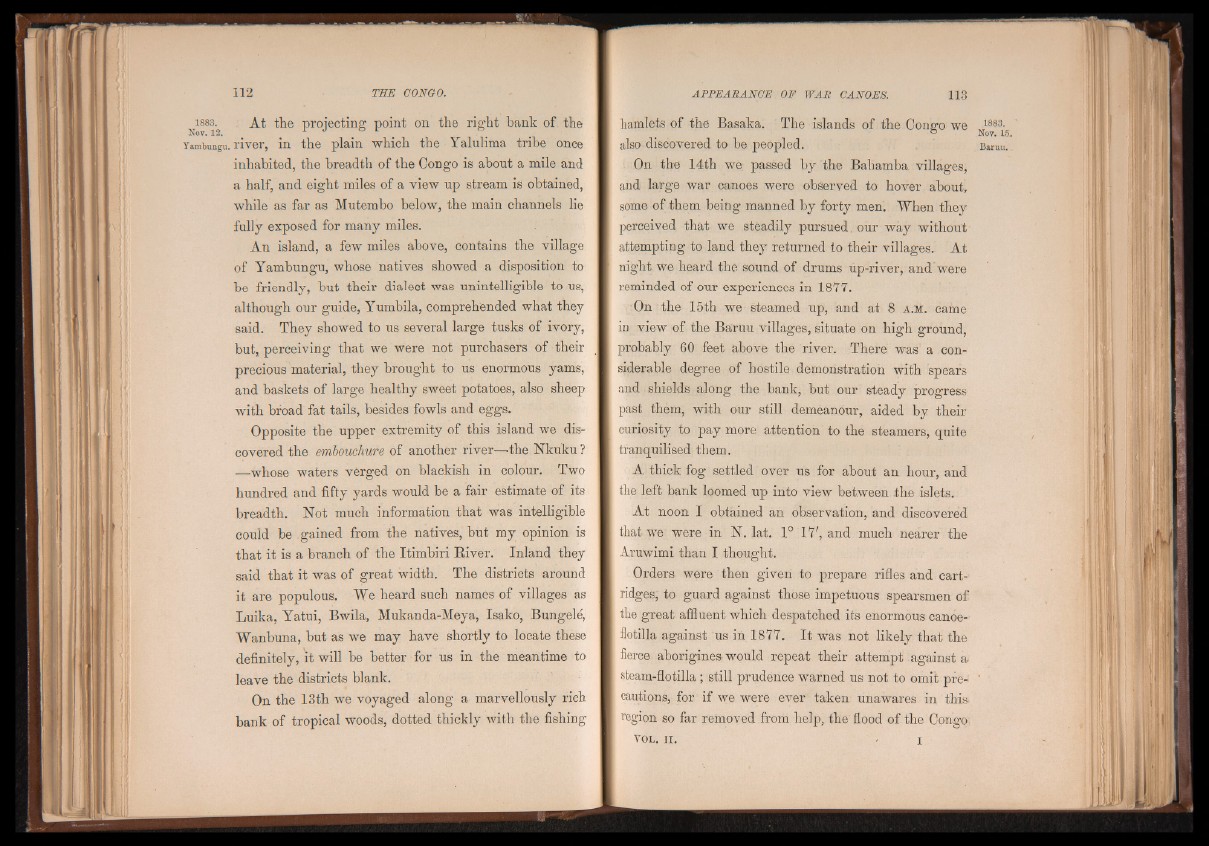
^1883.^ At the projecting point on the right bank of the
Yamtungu. river, in the plain which the Yalulima tribe once
inhabited, the breadth of the Congo is about a mile and
a half, and eight miles of a view up stream is obtained,
while as far as Mutembo below, the main channels lie
fully exposed for many miles.
An island, a few miles above, contains the village
of Yambungu, whose natives showed a disposition to
be friendly, but their dialect was unintelligible to us,
although our guide, Yumbila, comprehended what they
said. They showed to us several large tusks of ivory,
but, perceiving that we were not purchasers of their
precious material, they brought to us enormous yams,
and baskets of large healthy sweet potatoes, also sheep
with broad fat tails, besides fowls and eggs.
Opposite the upper extremity of this island we discovered
the embouchure of another river—'the Nkuku ?
—whose waters verged on blackish in colour. Two
hundred and fifty yards would be a fair estimate of its
breadth. Not much information that was intelligible
could be gained from the natives, but my opinion is
that it is a branch of the Itimbiri River. Inland they
said that it was of great width. The districts around
it are populous. We heard such names of villages as
Luika, Yatui, Bwila, Mukanda-Meya, Isako, Bungele,
Wanbuna, but as we may have shortly to locate these
definitely, it will be better for us in the meantime to
leave the districts blank.
On the 13th we voyaged along a marvellously rich
bank of tropical woods, dotted thickly with the fishing
hamlets of the Basaka. The islands of the Con °fr o we N1o8v8. 31-5.
also discovered to be peopled. Baruu.
On the 14th we passed by the Bahamba villages,
and large war canoes were observed to hover about,
some of them being manned by forty men. When they
perceived that we steadily pursued, our way without
attempting to land they returned to their villages. At
night we heard the sound of drums up-river, and’were
reminded of our experiences in 1877.
On the 15th we steamed up, and at 8 a.m. came
in view of the Baruu villages, situate on high ground,
probably 60 feet above the river. There was a considerable
degree of hostile demonstration with spears
and shields along the bank, but our steady progress
past them, with our still demeanour, aided by their
curiosity to pay more attention to the steamers, quite
trailquilised them.
A thick fog settled over us for about an hour, and
the left bank loomed up into view between the islets.
At noon I obtained an observation, and discovered
that we were in N. lat. 1° 17', and much nearer the
Aruwimi than I thought.
Orders were then given to prepare rifles and cartridges,
to guard against those impetuous spearsmen of
the great affluent which despatched its enormous canoe-
flotilla against us in 1877. I t was not likely that the
fierce aborigines-would repeat their attempt against a
steam-flotilla ; still prudence warned us not to omit pre- ’
cautions, for if we were ever taken unawares in this-
region so far removed from help, the flood of the Congo;
VOL. I I . i